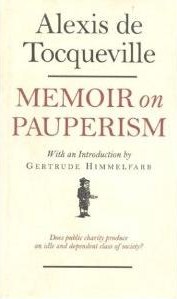Alexis de Tocqueville
Memoir on Pauperism. Does Public Charity Produce an Idle and Dependent Class of Society?

The great French man takes a look at the paradox offered by modern societies (in this case England, early 19th Century): "The countries appearing to be more impoverished (are the ones with) the fewest indigents", and "among the peoples most admired for their opulence, one part of the population is obliged to rely on the gifts of the other in order to live."
The key? Well-fare, public charity. Today it may not seem a paradox anymore, so ingrained in our righteous leftist minds it is. But Tocqueville saw it as it surreptitiously came forth, along with the Industrial Revolution. His analysis is clear-minded, cool, not coldly detached from the anguish of the miseries of the poor, but -on the contrary- interested enough to inquire into the roots of this modern paradox, which has since provided the daily fuel for the Left's demagoguery, and is the real opium of the self-blinded masses.
Tocqueville is not the Manichean the Left would like to think. His solution to the vicious cycle of wellfare-poverty-more-wellfare is not to cut through and banish it all. It is to get away with what went wrong in an originally fine idea: To cut loose from there, and return to the healthy idea of improving society, not contributing to its impoverishment.
A real diamond this book is, for its value and for its tiny size. You'll find where exactly the waters we're drinking from now got muddled up.
